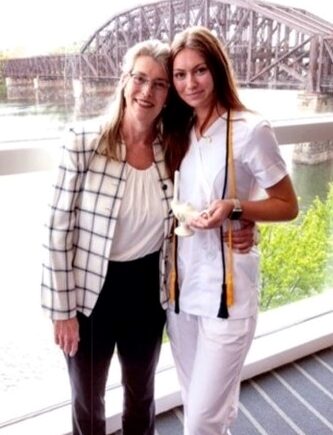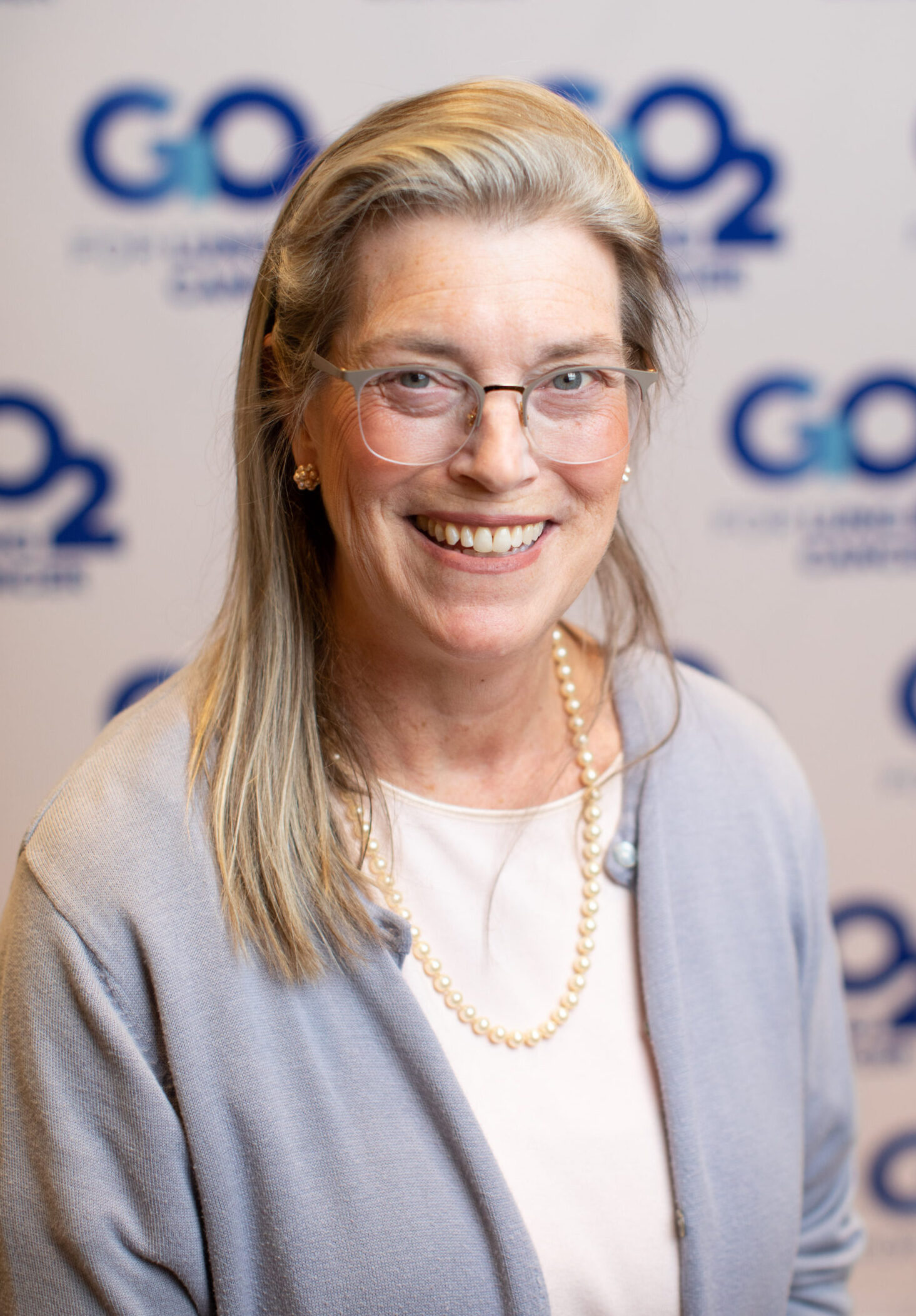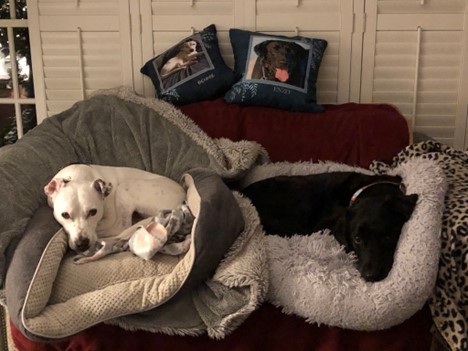By Tamara Gabrielli, MD
Dr. Gabrielli recently retired after a 30-year career as an anesthesiologist in Maryland and Washington, D.C. She lives in Rockville, MD and has three daughters in their 20s. She just celebrated her 64th birthday.
My diagnosis
 I was diagnosed with lung cancer about 16 months ago with early symptoms of unusual wheezing at night and a new blood-tinged cough. These symptoms led me to stop postponing a routine interval chest X-ray (that I had abandoned during COVID-19) required for employees by the hospital where I worked. It found my non-small cell lung cancer at stage 3A, originating in the left upper lobe.
I was diagnosed with lung cancer about 16 months ago with early symptoms of unusual wheezing at night and a new blood-tinged cough. These symptoms led me to stop postponing a routine interval chest X-ray (that I had abandoned during COVID-19) required for employees by the hospital where I worked. It found my non-small cell lung cancer at stage 3A, originating in the left upper lobe.
Suddenly, my abnormal severe fatigue could no longer be blamed on the stress and anxiety of poor staffing, supply shortages, and caring for COVID-19 patient airways on a regular basis. I had lung cancer! I left practice immediately because I did not want to risk poor outcomes in providing anesthesia care to patients without knowing the full extent of my disease. Luckily, I had the full support of my partner group to do this.
Assembling my care team and starting treatment
Because of my career in anesthesiology, I was able to take full advantage of the many professional connections I had collected over years of practice. I have a lot of experience with surgery but a bit less experience with cancer and its nonsurgical aspects of treatment. To make sure I was receiving the best care, I assembled an amazing team around me. This is an important part of the lung cancer treatment experience that everyone diagnosed with lung cancer will benefit from.
I quickly consulted four highly qualified medical and radiologic oncologists and two thoracic surgeons. I knew the “time currency” I was saving by acting quickly was precious, and I am fortunate to live in an area with a lot of good medical care options. I was able to start strong chemo treatments less than a month after my diagnosis and had a left upper lobectomy and extensive mediastinal lymph node dissection.
My anesthesia care was carefully curated because I knew what to ask for and how to get it, as I had provided this care to my patients many times. It was exhausting at times to perform this level of detailed advocacy for myself, but I kept thinking how lucky I was to have the professional connections that I do and how important it is for everyone who receives a lung cancer diagnosis to take an active role in their own care. So many people were incredibly kind and helpful, even if they didn’t already know me.
My treatment plan
Many of the removed mediastinal nodes from around my heart (nine out of 15) had cancer in them. For a few days my primary oncologist considered chest chemo-radiation, but in the end, at the recommendation of a very talented radiation oncologist, I was placed on a powerful EGFR inhibitor oral therapy within about two weeks of my surgery. I have been taking it for a year now. It has been effective in preventing a lung cancer recurrence to date, but I struggle with side effects from this every day. I am happy to report that my scans since surgery have shown no sign of recurrence or metastasis in the chest.
Connecting with GO2 and building hope
 Early in my diagnosis I made the invaluable connection with GO2 for Lung Cancer and their Senior Manager, Support Staff Miranda Goff, LICSW, who introduced me to the “Phone Buddy” program. My wonderful buddies have helped me throughout my experience with lung cancer, including offering me advice and support when I experienced the emotional tug of “scanxiety” in the month or so leading up to my first six-month post-operative CT scan. One of my buddies mentioned that he found it helpful to “keep busy” before a scan. I took him at his word and began scheduling multiple home repairs and improvements, which certainly did the trick.
Early in my diagnosis I made the invaluable connection with GO2 for Lung Cancer and their Senior Manager, Support Staff Miranda Goff, LICSW, who introduced me to the “Phone Buddy” program. My wonderful buddies have helped me throughout my experience with lung cancer, including offering me advice and support when I experienced the emotional tug of “scanxiety” in the month or so leading up to my first six-month post-operative CT scan. One of my buddies mentioned that he found it helpful to “keep busy” before a scan. I took him at his word and began scheduling multiple home repairs and improvements, which certainly did the trick.
One night, unable to sleep, I downloaded Bonnie Addario’s book “The Living Room” and read it through. The seed of a new optimism began to grow even though I was stressed and fatigued that next day. That optimism is still a young sapling today, after only a year of my journey.
As I healed from my surgery and adjusted to the daily targeted therapy, I was invited to attend GO2’s annual Lung Cancer Voices Summit in March of this year in Washington, D.C. I met so many supportive people and witnessed a lot of positive outlooks in people who are living with lung cancer, many of them at advanced stages. I got to travel to Capitol Hill and advocate with Maryland legislators for lung cancer funding and support in the Congressional budget.
After the summit, GO2 sponsored me to become a consumer research reviewer for the Congressionally Directed Medical Research Program’s Lung Cancer Research Program, known as CDMRP LCRP. My job is to make sure the panel knows how patients might be impacted by new studies. Earlier this month, I finished my service on my first two-day panel session. It filled me with hope to see how much great research is being done in the world to help people like me. The people I worked with have been amazing, kind, and helpful, and never complained when I repeatedly forgot to “un-mute” myself in Zoom.
 What I want you to take away from this is: hope, help, and kindness are out there. As a doctor, I do know that my cancer can come back, that radiation isn’t fun, and we need new drugs very badly. The future is uncertain. BUT: there are many days (now) that I don’t feel at all like a cancer patient. I have so many interests – my wildlife photography, my friends, my daughters, and my two wonderful dogs. My days are full of things to do that I never had time for before. Hope and time are nice to have right now. That’s what I want to share with you.
What I want you to take away from this is: hope, help, and kindness are out there. As a doctor, I do know that my cancer can come back, that radiation isn’t fun, and we need new drugs very badly. The future is uncertain. BUT: there are many days (now) that I don’t feel at all like a cancer patient. I have so many interests – my wildlife photography, my friends, my daughters, and my two wonderful dogs. My days are full of things to do that I never had time for before. Hope and time are nice to have right now. That’s what I want to share with you.
Earlier this week, the Women and Lung Cancer Research and Preventative Service Act of 2023 was introduced. If passed, this legislation would increase research focus on lung cancer’s unique impact on women, help improve access to lung cancer screening services, and elevate national awareness on the disease. Join GO2 in calling on Congress to pass this life-saving legislation on behalf of all women living with lung cancer.

Leave A Comment